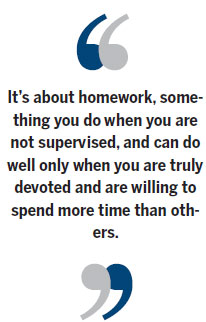Cogs in machine earn China 'gold star'
Updated: 2015-12-04 08:22
By Ed Zhang(China Daily Europe)
|
|||||||||||
Winning a spot in IMF basket came thanks in part to unsung technocrats able to think, experiment and learn
Despite the bad smog that enveloped Beijing recently (now blown away by wind, fortunately), Chinese took psychological comfort from the International Monetary Fund decision to "anoint", as some of the Western media put it, the yuan as part of its basket of reserve currencies, called special drawing rights, along with the dollar, the euro, the pound and the yen.
Crash course-type short messages about what the SDR is flooded China's mobile Internet world just hours after the decision was declared, from simple ones warning spendthrift tourists that they still cannot use yuan notes freely wherever they go in the world, to the more sophisticated ones discussing the new regulatory challenges Chinese financial officials are about to face.
The IMF decision was important. It is an international stamp of approval of what China has been working on - with awkward missteps and clumsy reactions at times - in integrating into a system that, to say the least, is a world that was never even mentioned in its college-level economics textbooks some 30 years ago.

It was not just a diplomatic success. Nor was it just about the country's rising economic heft in the world market, in trade volume and in its contribution to global growth. It represented "recognition of the progress that the Chinese authorities have made in reforming China's monetary and financial systems", as Christine Lagarde, IMF managing director, said in Washington.
It was enough of an encouragement. Former US Federal Reserve chairman Ben Bernanke called it in his blog on the Brookings website "China's gold star", as American teachers give to elementary school students who do a good job on their homework. Sounds condescending? Maybe. But it's about homework, something you do when you are not supervised, and can do well only when you are truly devoted and are willing to spend more time than others.
Internationally, the IMF decision offers a painful lesson to Europe. The yuan was awarded its share in the SDR basket, 11 percent of the lot, mainly by diluting the weight of the euro, whose share was lowered from 37 to 31 percent. There was no change in the dollar's dominance, still at about 42 percent.
Domestically, there is also a lesson. That the yuan can earn its anointment also has much to do with the people staffing its monetary regime, overseeing its day-to-day operations, and doing all the little things to make such a giant step forward possible.

They are what onlookers call, not without an undertone of scorn, technocrats, or China's modern-day mandarins. But in retrospect, they are individuals who are able to think, experiment and learn, and take responsibility.
One example was the change in the yuan exchange regime several months ago. It sent the yuan into an immediate, though short, downward spiral and alarmed international observers as another protectionist attempt to manipulate the currency, for which China was once a notorious target for American politicians.
But quickly (although how quickly was quick enough is contestable) after that, People's Bank of China officials seemed to have done a good job explaining to the usually critical Western press that this time was different. Market forces were the cause, not government meddling. And the difference was proved by the realities in currency trading in the following days.
The PBOC is not an institution specializing in handling public opinion, even less a strong official mouthpiece, although it does seem to need a few more savvy individuals to do an even better job in international communications. Most of the officials there are, like officials seen in any other central government department, young people who grew up in an environment where the government didn't need to explain what it did unless in a stormy propaganda campaign. But they have learned to react quickly to the realities they face, to explain to their critics in raiding professional language, and back up their explanation with the facts.
In stark contrast, there are regulatory bodies in the Chinese financial industry, along with many listed corporations controlling an amount of wealth that's comparable to some countries' GDP, that seem to have never learned this. They never say sorry, and never make up for it, after they have stumbled or managed something poorly. That is why they always have a public image problem. They can never manage to get a gold star, because they just never want to do their homework.
The author is editor-at-large of China Daily. Contact the writer at edzhang@chinadaily.com.cn
(China Daily European Weekly 12/04/2015 page14)
Today's Top News
Xi in South Africa to boost China-Africa cooperation
SOEs face headwinds as 21% witness profits decline
President Xi arrives at South Africa for state visit
China ready for risks after yuan included in SDR
Premier League coaches to aid China's soccer goal
Chinese companies invest in City Football Group
Investment expected as Xi arrives in Zimbabwe
Xi's Zimbabwe visit to elevate bilateral ties to new high
Hot Topics
Lunar probe , China growth forecasts, Emission rules get tougher, China seen through 'colored lens', International board,
Editor's Picks

|

|

|

|

|

|






